Home |
Contents |
Photos |
News |
Reviews |
Store |
Forum |
ICI |
Educators |
Fans |
Contests |
Help |
FAQ |
Info


Review of GUNPOWDER GIRL AND THE OUTLAW SQUAW
(9/29/05)
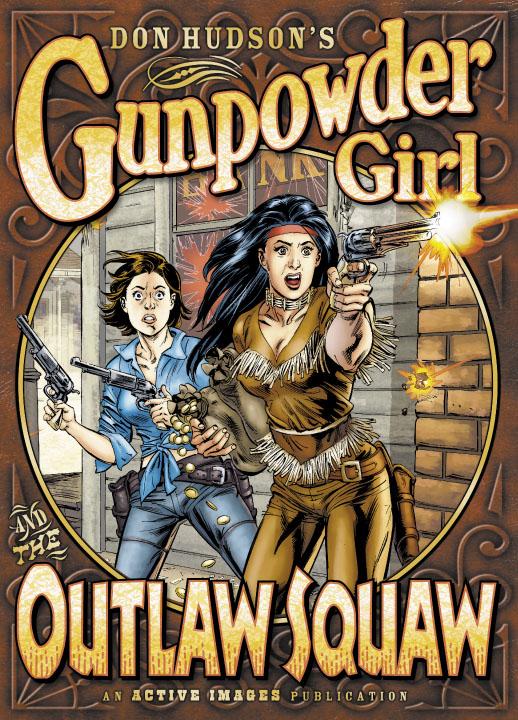 Gunpowder Girl and the Outlaw Squaw
Gunpowder Girl and the Outlaw Squaw
72pp Sepia tones, includes an interview with the creator
June 2005 | $12.95
By Don Hudson
Three women in the wild west forsake men and seek their fortune as outlaws. When their leader is shot by a vengeful marshal, the other girls become fugitives and must overcome their mistrust, prejudice and fears to survive! Action-packed with gorgeous art, this 7.2" x 10" OGN is printed in beautiful sepia tones. Design by Comicraft, cover color and tones by Steve Buccellato.
Quotes and Reviews
"Starts off playing on both Western and gender stereotypes, and then quickly turns it on its head. A genuinely entertaining tale and one heck of a Western." (4 out of 5 stars)
— Adam White, ComicCritique.com
"A different sort of western that knows how to have fun. Female outlaws — an orphan girl with no home and an Indian woman who refuses to live on a reservation — cut a swath through Texas in the late 1800s."
— Steven Grant
"A rollicking western by Forever Amber's Don Hudson; an artist who follows Neal Adams' footsteps with a little Ernie Colon back treading. The heroes and villains of the piece aren't quite so easily shelved in the white hat/black hat section of the general store. Normally shades of gray characters make me ill and only seem pretentious, but Hudson's view is historically accurate, and the characterization is so strong that you find yourself wanting more of the adventure."
— Ray Tate, SilverBulletComicBooks.com
"Terrific gunfight choreography."
— Randy Lander, TheFourthRail.com
"Moves, guts and raw emotion."
— SequentialTart.com
*****
Gunpowder Girl and the Outlaw Squaw — Character Descriptions
Outlaw Squaw (Anuteh Iron Bear)
The Indian wars have destroyed her community and what's left of her family has been sent to the reservation. She broke away believing that the way to survive in a white man's world is with money. Her decision to go outlaw as made her an outcast with her people and cost her the love of her husband, Iron Bear.
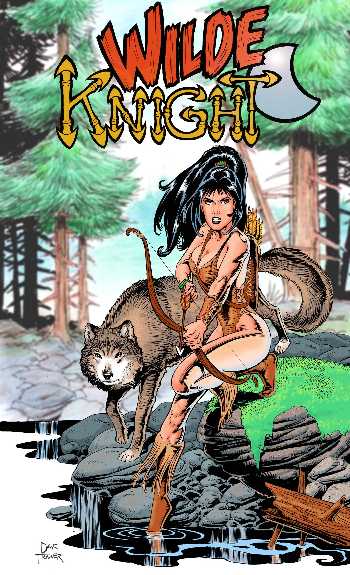
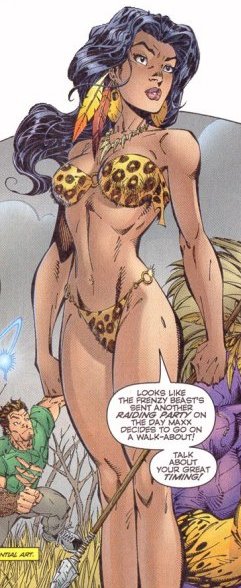
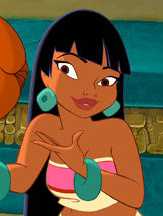
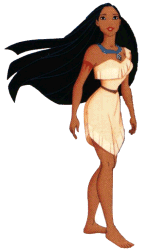

Rob's review
I didn't read the comic, but I skimmed it in the shop. I didn't buy it for the following reasons:
The Outlaw Squaw is your typical raven-haired buxom Indian beauty. She doesn't look much like an actual Indian woman, but does look like someone's fantasy of an Indian woman. From Cher to Pocahontas to Chel to Rainmaker to Wilde Knight, white men love to explore and exploit sexy Indian princesses.
As far as I can tell, the story isn't set in a specific place or time. It's the generic West of the second half of the 19th century. Also, the Outlaw Squaw doesn't seem to come from any particular tribe or culture. Generic Indians are the bane of authentic Native-themed storytelling.
The idea that a lone Indian woman would abandon her husband and tribe to enter the white's world by herself is almost too farfetched to believe. What sequence of events could possibly have led her to overthrow 20 or so years of training and acculturation? Women traditionally were keepers of the culture, tenders of the hearth and home. They were much less likely than their menfolk to stray from the fold.
If, say, 5% of Western outlaws were women and 5% were Indians, the odds of any outlaw being an Indian woman would be 1 in 400. If only 1% of Western outlaws were women and 1% were Indians, the odds of any outlaw being an Indian woman would be 1 in 10,000. In short, this character doesn't seem very plausible.
Supposedly the Outlaw Squaw is given this title; she doesn't call herself that. Nevertheless, the "Outlaw Squaw" title is problematical at best. On the one hand, non-Indians applied the word squaw freely to Indian women in those times, so it's probably historically accurate. On the other hand, it's considered derogatory today. The creators chose the title today even though they knew or should've known it might offend some people.
My conclusion: The Outlaw Squaw appears to be a strong character who thinks and acts independently but has no connection to any real tribe or culture. For other Indians of this type, see the original appearances of Tonto, Turok, Wyatt Wingfoot, Thunderbird, et al.
Related links
Squaw: the s-word
Comic books featuring Indians
* More opinions *
|
|
. . .
|

|
Home |
Contents |
Photos |
News |
Reviews |
Store |
Forum |
ICI |
Educators |
Fans |
Contests |
Help |
FAQ |
Info
All material © copyright its original owners, except where noted.
Original text and pictures © copyright 2007 by Robert Schmidt.
Copyrighted material is posted under the Fair Use provision of the Copyright Act,
which allows copying for nonprofit educational uses including criticism and commentary.
Comments sent to the publisher become the property of Blue Corn Comics
and may be used in other postings without permission.
 Gunpowder Girl and the Outlaw Squaw
Gunpowder Girl and the Outlaw Squaw




